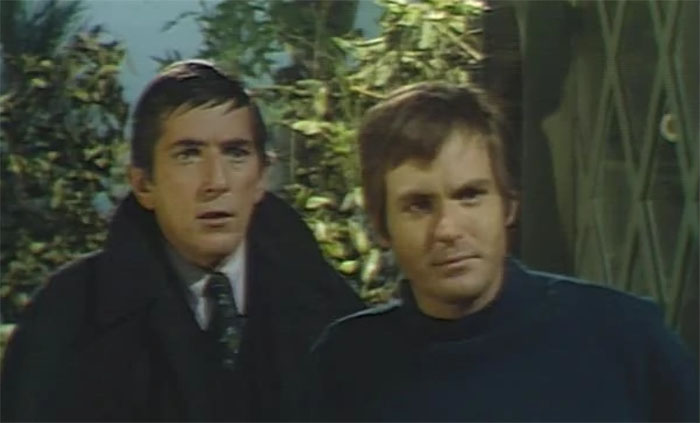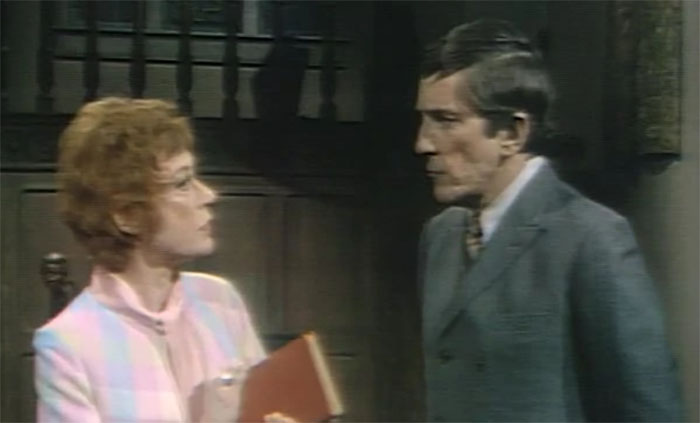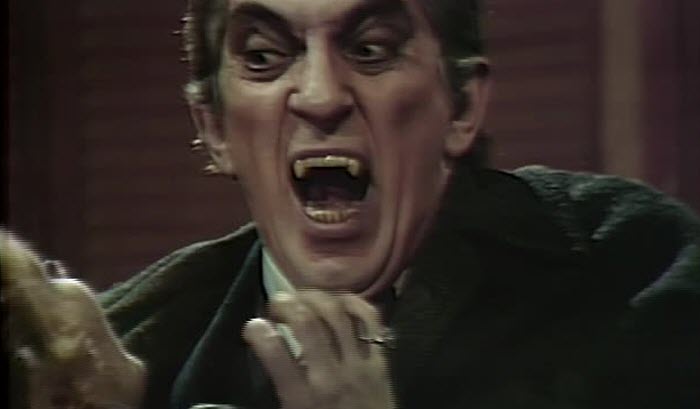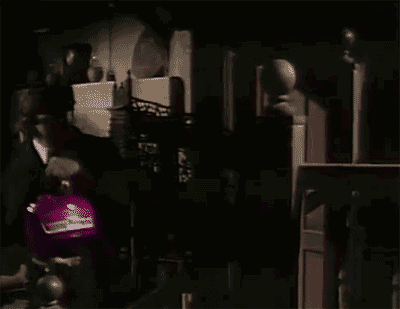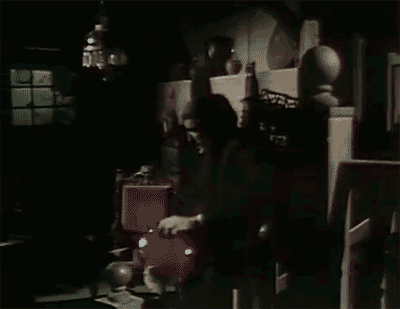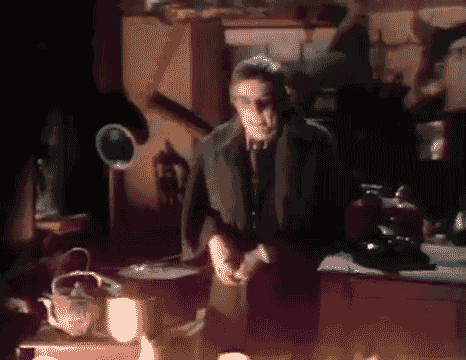By PATRICK McCRAY
Taped on this date in 1968: Episode 677
Chris survives his night in the house of the dead, but will he survive Julia’s offer to help his “condition”? Chris Jennings: Don Briscoe. (Repeat; 30 min.)
After returning from a night secure within the mausoleum, Chris arrives home to find Julia expressing her doubts about helping him. After bribing away a spying David with soda, Chris later ingests poison laced into his drink by an invisible hand.
Is this the most compassionate episode of Dark Shadows ever? Hell, even the homicidal ghost is acting out of love. Everyone is compassionate except for David, the little psychopath, and if he weren’t, it would ruin the episode with Cosmic Inconsistency. He inserts a much-needed moment of ghoulish voyeurism into the proceedings, and it’s darn right that Chris denies him a second soda as a consequence. Now, off with you, Davey. It’s not so bad. Don Briscoe called you “man,” and that’s about the highest honor I can think of… after hearing David Selby ask, “You wanna touch these? No. Higher. No, not those, either. The ones in the box. Yeah, glued them on every day for six months. Weird, huh? Reminds me of the fake muttonchops on Dark Shadows.”
The only semi-holdout in the episode’s kindness klub is Julia, again, keeping the universe in order. When was the last time Chris Jennings bought her a Rob Roy and a steak sandwich at the Blue Whale? Or even let her bum a Gauloises? Exactly. Next time, maybe you’ll think about that when you come to her with out-of-network complaints about lycanthropy. She thinks it’s all in your head and intimates as much to Barnabas before he reminds her that Dan Curtis is paying the light bill.
I’m not sure what Chris Jennings did to earn Julia’s casual sadism. Maybe she just assumes that he’ll reject her, too, and wants to get a head start. Julia and Barnabas parallel each other on the clock of morality, here, both equally humane, but on different sides. Barnabas, emerging more and more from his shell of evil and Julia seemingly retreating into hers. Very purposefully. They are classic reflectors in this sense. Each is a walking yin-yang, and each has either a bit more malice or benevolence, depending. Why are they such? Quantity of suffering and alienation. You would think that Julia would have more sympathy, but her suffering is not all it’s cracked up to be. Yes, yes, an unmarried woman in 1969 in a male-dominated profession, nearing fifty. However, that field is medicine, she’s still has the prestige to head Windcliff, her salary is such that she can take years off at a time, and she’s in the most advantaged demographic in the country. Most of all, she’s human. Barnabas, on the other hand, is only recently human. He’s sitting on nearly two hundred years of interred imprisonment and starvation, has been dragged centuries away from anything familiar, has taken at least a score of lives, and knows the ambiguity of trying to kill the people he’d normally join in a hunt against something like himself. So, yes, he perhaps knows a little bit more about compassion in this regard.
In a year, would Julia be as parsimonious with her affections? I don’t think so, and it’s this Julia that we remember. Or SHOULD remember. It’s the right of the wrong to live forever in 1967, but I’m a man of modern times, and aspire for the future awaiting me in 1970. There, Julia is a woman who’s traveled through time three times, killed her evil twin in a parallel universe, escaped zombies, survived multiple possessions, and did it all while growing her hair back out. That tends to mellow a person out.
But when it comes to being a mensch, no one fulfills the requirements like Don Briscoe. Dark Shadows has a number of civilians interact with the Collins family, but none project the package of likability, intelligence, and steadfastness like Chris Jennings. This matters. Barnabas has reclaimed his humanity in every sense. Normally, stories would have him test that mettle by helping someone of dubious intent… who would no doubt betray him. While it’s true that this happens far, far too frequently in real life, in art, it is empathy-shaming. Yes, yes, it builds conflict and an organic sense of drama, even if it allows the spiritually stingy a moment of self-congratulation. But Dark Shadows is a virtuoso at playing a long game it doesn’t even know is whirling around it. Barnabas must foster his newfound humanity by helping someone worthy of it. This justifies the act. By doing so, the series will forever give him the One Example of a Good Man that will challenge him when he wants to turn his back on a ne’er-do-well.
That’s the problem with cynics. They never met the One Example.
This episode hit the airwaves Jan. 28, 1968.

